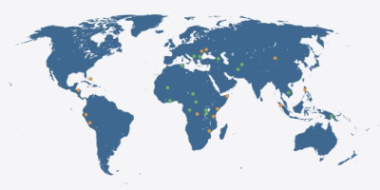Transparency and Accountability

Public trust and confidence in justice sector institutions is key to investment and commercial transactions, and necessary for sustainable development and social change. IDLO is engaged in programming that enhances the integrity and capacity of such institutions to promote good governance by holding State and other constituencies, including the private sector, accountable, ultimately leading to people’s confidence in the laws and institutions that are meant to serve them.
In turbulent times, invest in justice and peace
“There are silver threads which the international community has woven into a tapestry known as the UN 2030 Agenda for Sustainable Development,” remarked IDLO’s Director-General Irene Khan at the opening of IDLO’s 2018 Partnership Forum. “At the heart of this tapestry is access to justice and the rule of law.”

Assembly of Parties and Partnership Forum 2018
The forthcoming Annual Meeting of the Assembly of Parties and Partnership Forum 2018 will take place on November 20 and 21, 2018.

Establishing the High Anti-Corruption Court in Ukraine
Despite the positive momentum from Ukraine’s justice sector reforms, there has been a lack of court judgments in top corruption cases, underscoring the need for greater institutional efficiency, transparency and independence in the process of prosecution. As corruption cases often involve complex financial schemes with elements of money-laundering, there is a strong need to delegate them to a specialized court. In response to these needs, the High Anti-Corruption Court was formally established on April 11th, 2019.
Kyrgyz Supreme Court publishes cases of alleged judicial interferences
The Supreme Court of the Kyrgyz Republic is now publicizing incidents of alleged out-of-process interferences in judicial activities online. The initiative represents an important measure in the context of the judiciary’s broader efforts to increase transparency and inform the public, and also works to prevent any undue influence or pressure on judges.

Laws for e-governance: unifying public registers in Ukraine
A resolution adopted by the Ukrainian government in May 2018, drafted with support from IDLO, is paving the way for a national legal framework that will underpin an innovative e-governance system connecting all electronic public registers across the country.

Strategic Investment in Rule of Law Programming
Growing insecurity and instability, recurring and protracted conflict and violence, increasing inequality, exclusion and discrimination, deterioration of international human rights and humanitarian norms, all signal the importance of strengthening the rule of law in today’s rapidly changing world. Notably, Goal 16 of the 2030 Agenda for Sustainable Development seeks to promote peace, justice and strong institutions.
Increasing Public Trust in the Judiciary in Kyrgyzstan
The Kyrgyz Republic has made significant strides in working toward improvements to a justice system shaken to the core following the 2010 Revolution. While a wholesale reselection process of judges changed the landscape and provided hope for real change, it also created a judiciary staffed with many inexperienced, under-skilled first-time judges who are more easily exposed to negative influences - both perceived and real. Consequently, the public mistrusts the judiciary and holds a negative perception of it being corrupt, inefficient and dependent on other branches of government.
Philippines Forum on Justice and Integrity
Joint Forum – Why Our Work Matters? Revisiting Institutional Efforts on Justice and Integrity
The realization of justice depends on respect for institutions and the rule of law. By adhering to well-defined legislation, impartial rulings can facilitate a fair, efficient and accountable delivery of justice.

Judicial cooperation to end sexual violence in Liberia
As part of IDLO's project to increase accountability for sexual and gender-based crimes in Liberia, it is working to build the capacity of judges to effectively handle and dispose of sexual and gender-based violence cases.

Pages
Key Initiatives
-
 As part of IDLO’s continuous commitment to accountability and results-based management, IDLO is pleased to share this Evaluation Brief (summarised evaluation report): “Evaluation of the project "Supporting Justice Sector and Anti-Corruption Reforms in Ukraine - Phase 1”. The evaluation has been conducted by independent evaluation experts, supervised by IDLO’s Evaluation Unit.
As part of IDLO’s continuous commitment to accountability and results-based management, IDLO is pleased to share this Evaluation Brief (summarised evaluation report): “Evaluation of the project "Supporting Justice Sector and Anti-Corruption Reforms in Ukraine - Phase 1”. The evaluation has been conducted by independent evaluation experts, supervised by IDLO’s Evaluation Unit. -
 Despite the positive momentum from Ukraine’s justice sector reforms, there has been a lack of court judgments in top corruption cases, underscoring the need for greater institutional efficiency, transparency and independence in the process of prosecution. As corruption cases often involve complex financial schemes with elements of money-laundering, there is a strong need to delegate them to a specialized court. In response to these needs, the High Anti-Corruption Court was formally established on April 11th, 2019.
Despite the positive momentum from Ukraine’s justice sector reforms, there has been a lack of court judgments in top corruption cases, underscoring the need for greater institutional efficiency, transparency and independence in the process of prosecution. As corruption cases often involve complex financial schemes with elements of money-laundering, there is a strong need to delegate them to a specialized court. In response to these needs, the High Anti-Corruption Court was formally established on April 11th, 2019. -
Growing insecurity and instability, recurring and protracted conflict and violence, increasing inequality, exclusion and discrimination, deterioration of international human rights and humanitarian norms, all signal the importance of strengthening the rule of law in today’s rapidly changing world. Notably, Goal 16 of the 2030 Agenda for Sustainable Development seeks to promote peace, justice and strong institutions.
-
 The Kyrgyz Republic has made significant strides in working toward improvements to a justice system shaken to the core following the 2010 Revolution. While a wholesale reselection process of judges changed the landscape and provided hope for real change, it also created a judiciary staffed with many inexperienced, under-skilled first-time judges who are more easily exposed to negative influences - both perceived and real. Consequently, the public mistrusts the judiciary and holds a negative perception of it being corrupt, inefficient and dependent on other branches of government.
The Kyrgyz Republic has made significant strides in working toward improvements to a justice system shaken to the core following the 2010 Revolution. While a wholesale reselection process of judges changed the landscape and provided hope for real change, it also created a judiciary staffed with many inexperienced, under-skilled first-time judges who are more easily exposed to negative influences - both perceived and real. Consequently, the public mistrusts the judiciary and holds a negative perception of it being corrupt, inefficient and dependent on other branches of government. -
 The Brief (or Lessons Learned Brief), titled Avoiding Violence and Enhancing Legitimacy: Judicial Preparedness for Handling Electoral Disputes in Kenya and Beyond, explores IDLO’s support to the Kenyan judiciary to resolve electoral disputes. The 2007 electoral violence in Kenya demonstrated that disastrous consequences can follow when the electoral dispute resolution system is not trusted to deal fairly and efficiently with contested elections.
The Brief (or Lessons Learned Brief), titled Avoiding Violence and Enhancing Legitimacy: Judicial Preparedness for Handling Electoral Disputes in Kenya and Beyond, explores IDLO’s support to the Kenyan judiciary to resolve electoral disputes. The 2007 electoral violence in Kenya demonstrated that disastrous consequences can follow when the electoral dispute resolution system is not trusted to deal fairly and efficiently with contested elections.
Latest Activity
|
Publication
|



